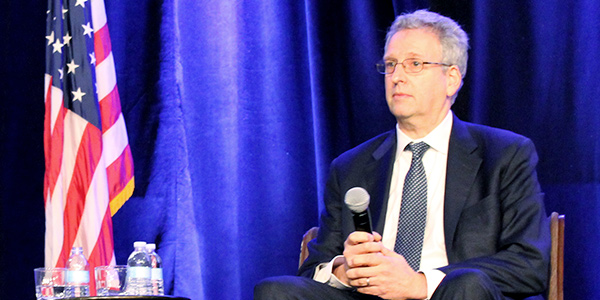By Michael Brooks
WASHINGTON — FERC Commissioner Richard Glick on Tuesday provided some insight into the “vigorous debate” over natural gas pipeline approvals that has divided the commission along party lines.
Speaking at the National Association of Regulatory Utility Commissioners’ Winter Policy Summit, Glick said that, by failing to consider the impact of greenhouse gas emissions when licensing pipelines, “the commission is essentially ignoring” the 2017 D.C. Circuit Court of Appeals’ order that remanded FERC’s approval of an environmental impact statement for the Southeast Market Pipelines Project. (See FERC Must Consider GHG Impact of Pipelines, DC Circuit Rules.)
In its rejection last May of a rehearing request of its environmental assessment for Dominion Energy Transmission’s New Market Project, FERC ruled 3-2 along party lines that it will no longer prepare upper-bound estimates of GHG emissions when “the upstream production and downstream use of natural gas are not cumulative or indirect impacts of the proposed pipeline project.” (See FERC Narrows GHG Review for Gas Pipelines.)
Glick, a Democrat, has issued several dissents in the commission’s approvals of gas infrastructure because of his opposition to that policy. “What gets me concerned about that is I think I get this kind of reputation as being against all natural gas pipelines. That’s just not true. That’s simply not true,” he told a ballroom of state regulators and their staff at the Renaissance Washington Hotel. “The fact is I think we need to do more analysis. … There are certainly pipelines that I could vote for. If we weigh the benefits of that pipeline versus the greenhouse gas emissions, I think that I could end up voting for them.”
Fellow Democratic Commissioner Cheryl LaFleur has voted for certain pipelines after considering their emissions but also partially dissented on those projects, noting the rest of the majority did not take emissions into account. (See Dem Dissents Show FERC Divide on Carbon.)
“I think the fact that the commission is not doing its job, we’re creating a lot of uncertainty, legal uncertainty in particular,” Glick said.
‘Not Enough Compromise’
With the death of Commissioner Kevin McIntyre, there is now a 2-2 partisan split, and Chairman Neil Chatterjee has been pulling gas items from the consent agenda at open meetings.
“I’m trying to figure out what the harm is. I think we can do the analysis. The numbers aren’t that hard to figure out,” Glick said. “I’m just trying to figure out what [the Republican commissioners’] real motivation is, and sometimes I worry it’s from an ideological perspective about climate change.”
He said the social cost of carbon is “a good tool for us to be able to determine whether an externality is significant, and if it’s significant, if it’s outweighed by the benefits” of a proposed project.
Idaho Public Utilities Commissioner Kristine Raper asked Glick whether he was concerned about a lack of plaintiffs to appeal FERC decisions on which he dissented. He said “there’s a reasonable chance” some of them would be overturned by the courts because “the commission didn’t do what it was supposed to do under the various statutory requirements.”
But he noted the plaintiff in the Southeast Market case declined to appeal FERC’s order on remand upholding its original decision, in part because of a lack of resources. “That is a concern. I think you’re going to see that. There’s kind of a fatigue out there, and there’s not sufficient resources sometimes to take these cases to the courts.”
Speaking to reporters, Glick said “we’re still having discussions” about the emissions dispute. He wants the commission to repeal the policy from the New Market case, “but so far they haven’t done that, so [there’s] not enough compromise at this point.”
Despite the dispute falling along party lines, Glick defended the commission against charges of politicization. “There have been a number of articles written, and I’ve read those articles [asking] are we independent anymore? Is the Trump administration telling us what to do? Are the commissioners themselves being too political, whether it’s on the left or on the right? …
“But in reality, I think FERC itself is as independent as an independent agency can get,” he said. “And even though our decisions or our votes come down on party lines, I think among the commissioners themselves, I think there’s never really a discussion of politics.”
Twitter Spat
Asked by a reporter if there were any issues every commissioner agreed on, Glick said there were plenty, highlighting Order 841, a unanimous ruling a year ago that directed RTOs and ISOs to revise their tariffs to allow energy storage resources full access to their markets.
“I’d say 90-odd percent of the votes that we have” are unanimous, Glick said.
Glick also defended the statement that he and LaFleur made Feb. 5 regarding FERC’s inaction on Vineyard Wind’s request for a waiver ahead of ISO-NE’s 13th Forward Capacity Auction. (See ISO-NE Completes FCA 13 Despite Controversy.)
Glick tweeted the statement, then Chatterjee responded with his own tweet subtly chastising his colleagues. “I do not discuss the commission’s internal deliberations with the public,” Chatterjee said. “Doing so would be highly inappropriate and might undermine the commission’s process.”
Bloomberg described the incident as a “Twitter spat.”
“I don’t think that was airing any grievances at all against the other commissioners,” Glick told reporters. “We were just expressing frustration that unfortunately, we didn’t issue an order and created some uncertainty. … I had a conversation with Chairman Chatterjee after that and explained to him that before we posted that statement, we checked with the general counsel’s office [and] we checked with the ethics adviser. … I think the chairman now understands that that was not an appropriate comment.”
Commissioner Bernard McNamee also appeared at the summit in an 11-minute discussion with Virginia State Corporation Commissioner Judith Jagdmann, but he did not discuss the gas policy dispute and left without taking any questions from the audience or reporters.





